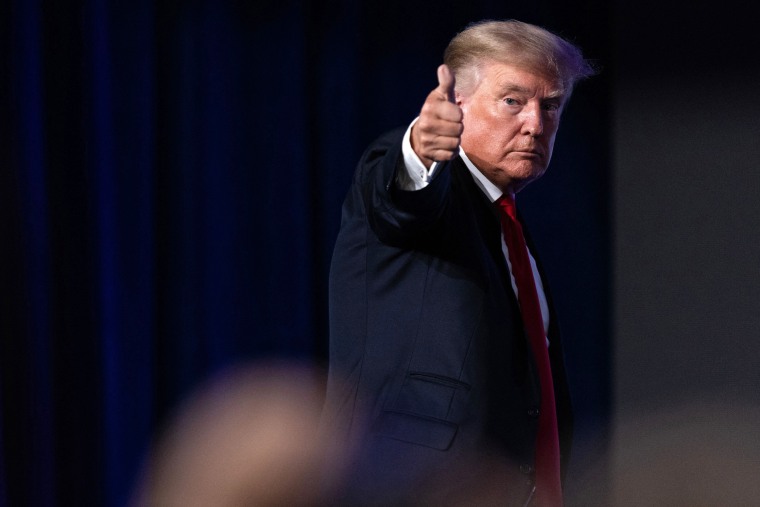Donald Trump issued a written endorsement last night for Alaska Gov. Mike Dunleavy, which at first blush, didn't seem especially noteworthy. The incumbent governor is a conservative Republican — whom Trump supported four years ago — who's ideologically aligned with the other GOP governors whom the former president is backing.
But what made last night's endorsement notable is the caveat Trump added to his statement:
"Alaska needs Mike Dunleavy as Governor now more than ever. He has my Complete and Total Endorsement but, this endorsement is subject to his non-endorsement of Senator Lisa Murkowski who has been very bad for Alaska.... In other words, if Mike endorses her, which is his prerogative, my endorsement of him is null and void, and of no further force or effect!"
Yes, the former president has introduced the political world to the idea of a conditional endorsement.
Trump said he's absolutely convinced that the incumbent governor, who's facing a far-right primary rival, is the right person for the job — that is, unless he supports his own party's incumbent U.S. senator, at which point Trump would immediately be convinced that Dunleavy is the wrong person for the job.
To be sure, as long as there have been elections, there has been horse trading in campaign endorsements. But as a rule, these transactions are more direct: I'll endorse you for office x, if you endorse me for office y. I'll back you in this election cycle, if you back me in the next election cycle. And so on.
I'm not aware of any modern examples of a national political figure trying to execute this kind of bank-shot: Trump wants Dunleavy to win, but only if the governor wants Lisa Murkowski to lose.
It suggests that the former president is actually indifferent toward Dunleavy's future. What he cares about is the Republican senator whose career he's desperate to end.
As for why Trump remains preoccupied with Murkowski, there's no great mystery here. As we've discussed, the Alaskan has been one of Congress' most interesting Republican members in recent years by repeatedly showing an independent streak most GOP lawmakers have taken pains to avoid.
When her party tried to replace the Affordable Care Act with a far-right alternative, for example, the Alaskan balked. When her party rallied behind Brett Kavanaugh's Supreme Court nomination, Murkowski was the only GOP senator to vote "no." Nearly two years ago, Murkowski didn't vote to convict Trump in his first impeachment trial, but she was one of a small handful of GOP senators to concede that the then-president's Ukrainian extortion scheme was wrong.
A year later, after Trump incited an insurrectionist riot and tried to overturn his election defeat, the Alaskan went even further, calling for his resignation and voting to convict in his second impeachment trial.
"[I]f the Republican Party has become nothing more than the party of Trump, I sincerely question whether this is the party for me," she said two days after the Jan. 6 attack.
It'd be an exaggeration to suggest Murkowski has been a center-left voice within her party — she did vote with the Trump White House more than 72% of the time — but more so than most Republicans, she's been uncomfortable with her party's radical descent.
For the former president, the senator's apostacy deserves punishment. Just as important, Trump wants to send a signal to other Republicans, warning them that he has the power to end their careers, too, if he's unsatisfied with their displays of loyalty.
Whether Dunleavy will embrace the bargain — accepting Trump's support in exchange for denying Murkowski support — remains to be seen, though his spokesperson suggested overnight that the governor is likely to remain neutral in his state's 2022 Senate race. Watch this space.

